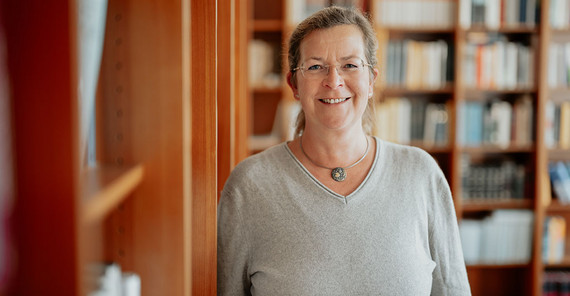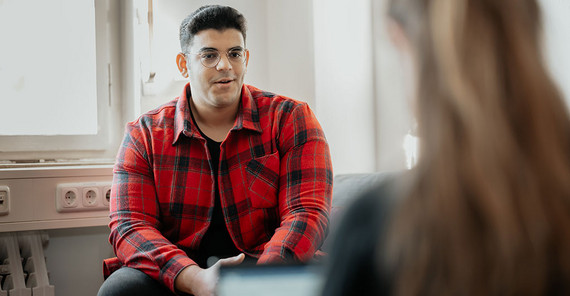Prof. Hähnchen also came to Potsdam because she no longer wanted to commute to East Westphalia. Born in East Berlin, the law graduate has lived in the north-east of Brandenburg for a long time. At the same time, Brandenburg’s capital offers her the chance to deal with other chapters of the past. “Potsdam is a place rich in history, whether that is Prussian legal history or that of the GDR.” After all, her office is located in a building that was constructed under National Socialism and was later home to the Academy of State and Law. “I was born in the GDR. Because it was so personal, I hesitated for a long time to deal with its legal system. But the longer I’m here, the more interested I become and I notice that the students feel the same way.”
Legal studies as a preparation for life
Prof. Hähnchen’s courses in the basic module on legal history are well attended anyway. She believes that students learn to understand the current law better if they know its origins and background. “Similar problems have existed at all times, but they were or are possibly differently solved,” Hähnchen explains. In her view, law and rule are closely connected. “It is written in the law, therefore it must be like this – a widespread view. However, law is not something God-given that you can’t change, it’s always in motion.”
Hähnchen did her doctorate and habilitation at Freie Universität Berlin and, starting in 2010, she was a professor in Bielefeld. There, she founded a legal advice service with students, which still exists. Later, Caritas approached her to support setting up another service for people who are mentally or socially in need. “I love thinking deep legal entanglements through, but you shouldn’t lose touch with everyday life either,” she says. That’s why she and her colleagues also wrote a legal encyclopedia for the Federal Agency for Civic Education: “Many wouldn’t do that at all because it’s not noble science. But teaching the law is important, I learned that from my doctoral supervisor Uwe Wesel.”
“Recht kinderleicht” (foolproof law) and “Rechtskunde-Online” (legal studies online) are two other projects that have emerged from this aspiration. Why is graffiti criminal property damage? Do animals have rights? And is making a present a deal and taking it back a steal? The legal scholar and her team answer such questions for children online in easy-to-understand language. “I’m interested in children’s questions: why, wherefore, and for which reason?”, she explains. At “Rechtskunde-Online”, teachers and learners can find teaching materials, for example on the Federal Supreme Court, euthanasia, or juvenile criminal law. “In most federal states, legal studies is now a subject for the German Abitur, but there is hardly any teaching material for it,” says Mohamad Soliman, who, together with Fabienne Paasch, works as a research assistant at the chair. That’s why Prof. Hähnchen and her team also want to integrate legal studies into teacher training and work together with the Centre for Teacher Training and Education Research at the University of Potsdam. “I think it is a subject whose fundamentals should be taught to everyone,” Hähnchen says. “Sooner or later, everyone is confronted with it: whether it’s about the subtenancy agreement, a divorce, or a will. It belongs in school as a preparation for life.” It can also give students at school a clearer idea of what they want to study before they enroll in it. “We have a terribly high dropout rate,” she says. “That worries me a lot. Many students start with idealistic expectations and then drop out because their expectations are not fulfilled in their studies. Others struggle through and hate what they do. Overall, we would waste fewer resources if we gave young people a clearer picture of what to expect beforehand.” This is why Prof. Hähnchen thinks the Bachelor of Laws, which now exists, makes a lot of sense. “It was always said that there was no job market for people with this degree. But there is definitely interest in public administration, insurance companies, and increasingly also in law firms.”
“Everyone needs legal advice at some point”
For Hähnchen, law is an application-oriented subject. That’s why it’s important to her that students gain practical experience before their legal traineeship. This is also why she founded “Legal-UP” at the University of Potsdam in the summer semester 2022. “Everyone needs legal advice at some point,” says graduate assistant Paasch. “But students in particular often can’t afford it. With us, it’s free of charge.” The student legal advice team doesn’t lack cases: Within half a year, they have already received 150 enquiries. “Most of them are looking for advice on problems relating to family law,” Soliman says. Who has custody of a child and what about alimony? Next are contracts, for example with the rental company or a gym. Disputes among neighbors are also common: What should I do, for example, if the leaves from the tree on the property next door end up on mine? “We also recently had an interesting case regarding an Amazon documentary about the rapper Bushido, where a waiter contacted us who was featured in the film without having received a fee or given his consent.”
Not only students and employees, but also people outside the university seek advice at the counselling center. “The word must have spread on what we offer,” says Paasch. And that is also the intention. “Although university members are our primary target group, we would like to also address the city’s people,” Hähnchen says. “At the same time, this service is an important aspect of legal education.” The students get the opportunity to perform legal counselling as a key qualification in their law studies. Paasch and Soliman give an introductory seminar on this. There, the participants get together in teams of two and are given a selected case. During a first meeting, the people concerned explain the problem to them. Then they work out the solution and present it to a lawyer. “Currently, nine lawyers support the students and guarantee that something good comes out of it,” Paasch says. During the second appointment, they present the solution to the respective people. “It is not always ideal," Hähnchen reports. But that is also an important experience. “Presenting an unpleasant outcome to a client is an important skill that is insufficiently addressed in law school.”
“Digitalization is applied legal history”
“The whole system is based on the voluntary work of lawyers,” Soliman says. “Without them, we wouldn’t be able to manage it at all.” To win these for the project, they not only used existing contacts but also wrote to law firms, Paasch says. 20 students are already on board who want to volunteer long-term. “Many tell us that they recharge their batteries when they help people,” Soliman says. “Because the studies are quite hard. And here you finally see faces.” They often develop sympathy and desperately want to help even if it is no longer possible. As with the client who had been suffering from a medical error for a long time and whom the students had to inform that he unfortunately was seeking legal advice 20 years too late. “In abstract cases they only give an expert opinion, but here they have to deal with emotional situations,” Paasch explains. In addition, the students learn to establish facts and explain them to the clients. “After all, they are dealing with normal people. The majority of lawyers are let loose on the public and have not learned to express themselves in an understandable way,” Hähnchen says. “I want to get more flexibility into their heads and get the students not only to learn a rule and its application but to think about their own actions – about what the law means to people.”
Soliman and Paasch compile an electronic file for each case. „We want to be able to accompany everything digitally,” Paasch says. That is far from a matter of course in legal practice. Digitalization is generally a major concern for the team. “We legal practitioners are not tech-savvy and also otherwise very conservative,” Hähnchen says and laughs. She already published a book on the digitalization of law in 2007, which was met with little interest at the time. “For me, digitalization is applied legal history: We will not be able to prevent it.” She repeatedly asks herself to what extent legal work can be digitized. One building block for this, she says, is legal technology - legal services that can be used online. The team plans to prepare legal advice cases for a legal tech application. “For standard cases, for example, to reclaim fees from a gym, people could enter all the information themselves into a website mask and receive initial help via an automated procedure,” Soliman explains. A project for which Prof. Hähnchen would like to see permanent support. After all, the expert in legal history knows how important it is to lead the law into the future - and to shape it in such a way that it serves the people.
The Researcher
Prof. Dr. Susanne Hähnchen studied law at Freie Universität Berlin. Since October 2020, she has been Professor of Civil Law and History of Law at the University of Potsdam.
Email: ls-haehnchenuuni-potsdampde
The Projects
www.recht-kinderleicht.de
www.rechtskunde-online.de
www.legal-up.de
This text was published in the university magazine Portal Wissen - Eins 2023 „Lernen“ (PDF).



